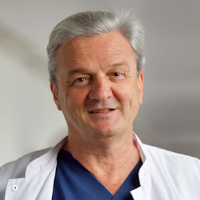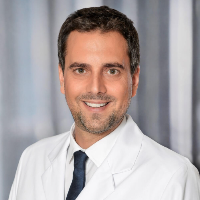Robot-assisted Prostatectomy With Removal of Prostate Tumor Metastases With a Gamma Probe in European hospitals
Treatment prices are regulated by national law of the corresponding countries, but can also include additional hospital coefficients. In order to receive the individual cost calculation, please send us the request and medical records.

Department of Adult and Pediatric Urology, Andrology
The Department of Adult and Pediatric Urology, Andrology offers the full range of services in the areas of its specialization. Men and boys with diseases of the reproductive system can be diagnosed and treated in the medical facility. Doctors also treat infertility and erectile dysfunction. Medical care is provided to men and women with diseases of the urinary system, namely kidneys, ureters, bladder, and urethra. The department is certified as the Prostate Cancer Center by the German Cancer Society (DKG), which indicates the excellent quality of the services provided in this area. The department's urologists have a perfect command of the innovative treatment methods, including holmium laser enucleation of the prostate (HoLEP), photodynamic therapy, and da Vinci robot-assisted surgery. The department employs comprehensively trained and experienced doctors who apply advanced medical achievements in their practice. Each patient is provided with an individual approach, considering their specific needs and wishes.







Department of Adult and Pediatric Urology
The Department of Adult and Pediatric Urology provides high-precision diagnostic examinations and effective treatment for diseases of the genitourinary system and reproductive system in men and boys. Of particular interest is drug therapy and surgical treatment of prostate, bladder, kidney, testicular, and penile cancers. The department is part of the Comprehensive Cancer Center Ulm (CCCU). For the patient, this means that their clinical case is studied by a multidisciplinary tumor board, which determines the optimal treatment tactics. The department is also certified by the German Cancer Society (DKG), so all therapeutic procedures meet strict national and international standards. The department's team of urologists also has unique clinical experience in the minimally invasive treatment of kidney stone disease, benign prostatic hyperplasia, neuro-urological dysfunction, and all urologic diseases in children. During the surgical treatment, the specialists at the medical facility successfully use minimally traumatic surgical techniques. They perform endoscopic, laser, minimally invasive, and robot-assisted surgery using the innovative Da Vinci system. The department treats about 3,000 inpatients and 9,000 outpatients with clinical cases of varying complexity annually. The number of surgical procedures performed and treatment outcomes are regularly published by the authorized commission of the Initiative Quality in Medicine (IQM).







Department of Urology
According to the Focus magazine, the Department of Urology ranks among the top German medical institutions specializing in prostate cancer treatment! The department offers the full range of high-precision diagnostic studies and effective therapeutic options for men with diseases of the genitourinary system. The doctors of the department specialize in the treatment of prostate cancer, benign prostatic hyperplasia, kidney, testicular cancers, urolithiasis, erectile dysfunction and urinary incontinence. There are also excellent qualifications in the field of reconstructive urology.






Thanks to the development of medicine, most patients with prostate cancer have a favorable prognosis. This disease is successfully treated in Europe. Moreover, in most cases, the doctors from the Departments of Urology remove the prostate using a minimally invasive laparoscopic technique. More and more surgical procedures are performed using robot-assisted surgical systems. They are minimally traumatic, rarely cause complications and reduce the patient's rehabilitation period. Countries with advanced medicine use special methods to detect metastases and determine tumor boundaries using radio navigation. They help reduce the risk of prostate cancer recurrence.
Content
- Who needs a robot-assisted prostatectomy?
- Sentinel lymph node resection
- Robot-assisted prostatectomy and DROP-IN gamma probe
- Additional fluorescence control
- PSMA-targeted radio navigation
- Treatment in Europe with Booking Health
Who needs a robot-assisted prostatectomy?
Prostate cancer patients who require radical treatment can get rid of the disease in one of the following three ways:
- Radiation therapy.
- Brachytherapy.
- Surgery.
A surgical intervention has many advantages: the lowest risk of recurrence, accurate staging due to the examination of removed lymph nodes, instant cure of prostate adenoma. However, the standard surgery is traumatic. It is performed through large incisions, requires long-term recovery, and leads to the development of erectile dysfunction and urinary incontinence in many patients.
In countries with advanced medicine, such surgical procedures are gradually becoming a thing of the past. Most of the interventions in urology are performed laparoscopically – through short incisions. Moreover, 50-70% of prostatectomies in countries with advanced medicine are performed using robot-assisted surgical systems.
Gamma probing is an additional procedure to remove lymph nodes potentially involved in the neoplastic process. It is required to reduce the risk of recurrence. Gamma probing is indicated not for all patients, but only for those who have more than 5% chance of having metastases.
Robot-assisted prostatectomy has the following benefits:
- Doctors have more freedom of action as compared to a conventional laparoscopic intervention, so they can remove lymph nodes even in the most unfavorable location without the risk of complications.
- Surgeons can see the surgical field better.
- Surgeons use additional techniques in order to detect sentinel lymph nodes, metastases, tumor boundaries (fluorescence navigation, radio navigation).
- Perfectly thin and even incisions.
- Instantaneous vascular coagulation that facilitates reduced blood loss.
Key benefits for the patient are:
- Minimal invasiveness of the surgical procedure and rapid recovery.
- Minimum time in the hospital.
- Low risk of erectile dysfunction and urinary incontinence.
- Rapid restoration of control over urination.
- Low risk of cancer recurrence (when using gamma probing).
Sentinel lymph node resection
At the time of diagnosis, prostate cancer may not have metastases in the lymph nodes. However, this is data from clinical trials. The stage is established by the results of CT or MRI scans, which do not reveal enlarged lymph nodes. Radionuclide methods are also sometimes used, but even they can only detect metastases from 1 cm in size.
Thus, if, from a clinical point of view, there are no metastases, this does not mean that they are really absent. There may be foci of metastasis several millimeters in diameter, which are a potential source of recurrence after prostate cancer surgery. To prevent recurrence, these lymph nodes must be removed.
In standard prostate cancer surgery, doctors do not look for metastases. They simply use nomograms and formulas to calculate the risk of tumor metastasis. If the probability is significant, then lymph node dissection (lymph node removal) is performed in a limited, standard or expanded scope. A risk of recurrence of more than 5% is an indication for extended lymphadenectomy. However, even in this case, the return of cancer is not excluded, since some of the lymph nodes, into which tumor cells penetrate, may be located outside the boundaries of standard lymph node dissection.
Radioisotope lymphoscintigraphy is a procedure that solves this problem. Intraoperative examination reveals the lymph nodes into which lymph flows from the tumor. These nodes are considered sentinel nodes – they are the first on the path of movement of cancer cells. Accordingly, if metastases appear somewhere, then first of all in them.
The essence of the diagnostic examination is that several injections of a radioactive substance are made into the patient's prostate before the surgery. Then, a thin long laparoscopic gamma probe is inserted during the operation into the patient's body through one of the ports. It is used to scan for radiation. The doctor detects the lymph nodes, in which the radioactive substance has accumulated, and removes them to prevent cancer recurrence.
Robot-assisted prostatectomy and DROP-IN gamma probe
Prostate cancer surgery in Europe is increasingly performed with the help of robot-assisted surgical systems. In recent years, doctors have begun to use the DROP-IN probe for robots instead of conventional laparoscopic gamma probes.
The problem with the conventional laparoscopic gamma probe is the lack of maneuverability. It has only four degrees of freedom. Some foci of accumulation of the radiopharmaceutical may not be detected, since the signals are muffled by the nearby large accumulations of radionuclide in the injection area. In addition, blocking the trocar with a probe prevents access to other instruments, so tissue aspiration and extraction cannot be performed. To solve this problem, an additional incision has to be made. Finally, in case of robot-assisted surgery, the diagnosis is complicated by the fact that the surgeon is not near the patient, but controls the robot using a remote console. Therefore, he needs the help of a human assistant who will carry out the necessary procedures, following oral instructions.
The DROP-IN probe can be used without an assistant. It has six rather than four degrees of freedom, unlike the laparoscopic probe. This probe can detect and remove more lymph nodes. The first experience with its use has already shown its advantages: patients had an average of more than 30 sentinel lymph nodes beyond the limits of the standard volume of extended lymphodissection. Moreover, 45% of the removed nodes were inaccessible or difficult for conventional laparoscopic gamma tracking.
Additional fluorescence control
Fluorescence diagnostics is an alternative to radio guidance. The doctor injects a substance that accumulates in the cancer cells and makes them glow when the laparoscope is specially illuminated. It also helps the doctors to detect metastases and tumor foci.
The best European hospitals use fluorescence diagnostics not instead of, but in addition to radio navigation. The gamma probe is more accurate, it allows the doctors to detect more sentinel lymph nodes. Its use was limited only by insufficient manipulation of standard laparoscopic probes, but this problem was solved with the development of probes for robot-assisted surgery.
PSMA-targeted radio navigation
The most advanced direction in the treatment for prostate cancer is the PSMA targeting technology, which is used for gamma probing. It involves the use of drugs that accumulate only in cancer cells.
The difference from the standard radio navigation technique is the selectivity of the accumulation of the radionuclide. When carrying out radioisotope lymphoscintigraphy, the radioactive substance simply accumulates in the sentinel lymph nodes, regardless of whether there are cancer metastases in them or not. However, drugs targeting PSMA (prostate-specific membrane antigen) only accumulate where there are cancer cells.
When performing prostatectomy, this type of radio navigation is usually used not only for the detection of metastases, but also for the determination of tumor boundaries. Patients undergoing salvage prostatectomy receive the greatest number of benefits. This is a surgical procedure to remove the prostate in those patients whose cancer has recurred after radiation therapy. Previously, such operations were performed only via open access: through a large incision. However, today the best European centers already perform them with the help of robotic systems. The minimally traumatic variant of the surgery became possible precisely thanks to the development of a probe used during robotic-assisted prostatectomy. This technology makes it possible to determine tumor boundaries, identify all deep tumor foci and metastases in the lymph nodes as effectively as in open surgery.
Treatment in Europe with Booking Health
To undergo prostate cancer treatment in one of the European hospitals, you can use the services of the Booking Health company. On our website, you can see the cost of treatment and compare prices in different hospitals in countries with advanced medicine in order to book a medical care program at a favorable price. The treatment in a European hospital will be easier and faster for you, and the cost of treatment will be lower.
You are welcome to leave your request on the Booking Health website. Our specialist will contact you and provide a free consultation on treatment in Europe. Booking Health will fully organize your trip abroad. We provide the following benefits:
- We will choose the best medical hospital for treatment in Europe, whose doctors have vast experience in robot-assisted prostatectomy using a gamma probe.
- We will help you overcome the language barrier and establish communication with the doctor from the Department of Urology at the European hospital.
- We will reduce the waiting time for the medical care program. You will undergo treatment in the Department of Urology on the most suitable dates for you.
- We will reduce the prices. The cost of treatment in Europe will be lower due to the lack of overpricing and additional coefficients for foreign patients.
- We will take care of any organizational issues: we will issue documents, meet you abroad and take you to the hospital, book a hotel, provide interpreting services.
- We will prepare a program and translate medical records. You do not have to repeat the previously performed diagnostic procedures.
- We will help you keep in touch with the doctors in the Department of Urology after the completion of treatment in Europe.
- We will organize additional examination and treatment in a European hospital, if required.
- We will buy medicines abroad and forward them to your native country.
Your health will be in the safe hands of the world's leading doctors. The Booking Health specialists will help you reduce the cost of treatment, organize your trip to a European hospital, and you will only have to focus on restoring your health.
Authors: Dr. Vadim Zhiliuk, Dr. Sergey Pashchenko

